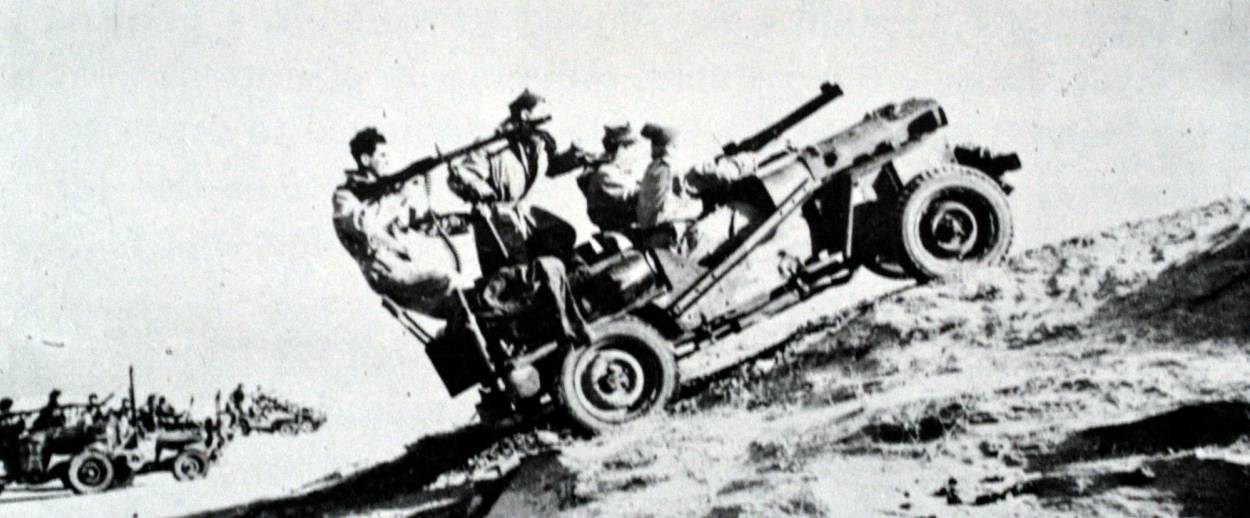Brothers-and Sisters-in Arms
The 75th Anniversary of the Palmach, the elite forces of the Haganah




As the sun set over Tel Aviv on Tuesday, throngs of elderly women and men began to fill the auditorium of Culture Palace theatre. Home to the Israel Philharmonic Orchestra, the Palace is no stranger to elderly crowds, but last night’s audience was special.
Before entering the auditorium, attendees congregated around signs with inscriptions like “Harel Brigade—The Fifth Battalion,” while exchanging backslaps and old anecdotes. They were veterans of the Palmach, or Plugot Machatz (Strike Forces), the elite combat arm of the Haganah, Israel’s pre-state army; They gathered to celebrate the Palmach’s 75th anniversary.
To begin the ceremony, flag bearers comprised of veterans, their children and grandchildren, marched on stage carrying the flags of the Palmach’s units as uniformed singers from an IDF entertainment troupe belted out the Palmach’s anthem. Israeli President Reuven Rivlin was in attendance, along with the IDF’s Chief of Staff, Gadi Eisenkot.
The evening was first and foremost a celebration of the Palmach’s influence on Israeli society: Once the IDF was established, hundreds of Palmach veterans became high-ranking officers and five became a Chief of Staff, such as Yitzhak Rabin, who became Prime Minister. No less influential was the Palmach ethos, like the cry of “Follow me!” that Israeli commanders are still expected to echo as they lead from the front, or the healthy chutzpah that encourages out-of-the-box thinking whether a soldier is in battle or developing a new computer program. The Palmach’s entertainment troupes had sung Hebrew-language translation of old Russian folk songs, which are now Israeli classics. Its humorists penned skits and stories that were wellsprings of modern Hebrew slang.
President Rivlin’s attendance at the ceremony was no less remarkable than some of the more surprising moments of his iconoclastic presidency. An acolyte of Zeev Jabotinsky and his right-wing brand of Zionism, Rivlin grew up an Irgun sympathizer. Israel’s early decades under Labor rule placed Rivlin firmly on the wrong side of history—though the Palmach had been disbanded in 1948, its ethos reigned supreme.
Last night, almost four decades after former Irgun commander Menachem Begin was elected Prime Minister, Rivlin struck a conciliatory tone. He celebrated the Palmach’s influence but noted that it was only made possible by David Ben Gurion’s decision to dismantle it, due to his prescient understanding that Israel could not afford to have rival armed factions, whether right-wing or left. But Ben Gurion opted to sanctify the concept of mamlachtiyut (which translates poorly as statism), the idea that the state transcends partisan politics. “It was the dismantling of the Palmach in November 1948, a dismantling that hurt and offended so many, that paved the way to the incredible contribution the Palmach had to the State as it was being built,” Rivlin told an audience of thousands, many of whom, if pressed, would likely still say that Ben Gurion’s decision was a mistake.
Today the Palmach is a handful of proud men and women (the Palmach was one-third female, with countless women in combat positions), the youngest of whom are now in their mid-eighties. My grandfather, Paul Kraus, who is nearly 90 years old, was there as well. A survivor of Auschwitz, he had spent the early post-war years with my grandmother helping to smuggle Jews across the European borders to the boats that would taken them to Palestine. The young couple arrived in Haifa when Israel was barely a week old. My grandfather was enlisted in the Palmach the very next day, and fought in the battles defending Jerusalem.
The Palmach was a shoestring army created from scratch, a far cry from today’s IDF with its F-16s and Iron Domes, and yet Israel’s own Greatest Generation won a war and created a state out of thin air, while paying the ultimate price: 1,168 of its 6,000-strong force—or nearly twenty percent—were killed.
Last night was the tenth such Palmach ceremony, equal parts class reunion and farewell party. Though the attendees were almost uniformly spry and feisty, their numbers are dwindling and the eightieth anniversary will doubtless be a very different affair. Above all else, the Palmachnik’s irreverence will be sorely missed. Even if President Rivlin is correct in his celebration of Ben Gurion’s mamlachtiyut, Israel under Benjamin Netanyahu is heavy on rhetoric and pomp and circumstance but could do with more Palmach-style chutzpah, which may very well not be reproducible. That healthy disrespect for the trappings of statehood, coupled with unerring patriotism, comes naturally, I suppose, to Palmachniks like my grandfather and so many others, who have visceral memories of Israel when it was barely a start-up, and for whom generations of its most storied leaders and most beloved citizens were their closest friends, their brothers in arms.
Previous: New Novel Tells Little-Known Palmach History
Related: Uncivil
VoxVault: Reassessing Menachem Begin: Terrorist? Humanist? Man of the People?
Tal Kra-Oz is a writer based in Tel Aviv.